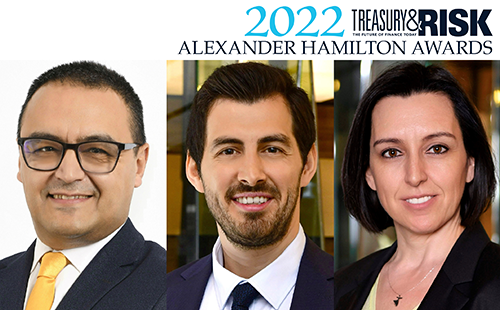 One of the big—and costly—hassles for treasurers of globalcompanies that operate in many different currencies has always beenthe need to hedge payables and receivables to minimize the risk ofa significant shift in exchange rates.
One of the big—and costly—hassles for treasurers of globalcompanies that operate in many different currencies has always beenthe need to hedge payables and receivables to minimize the risk ofa significant shift in exchange rates.
For example, if a U.S.-based company had a subsidiary in Italythat expected to have to pay in euros in six months for anexpansion, the parent company would enter into a transaction tohedge the anticipated payable amount out to the payment date at aset exchange rate. That meant paying a bank or dealer for a forwardeuro contract and tying up the money for six months.
|Ferdinand Jahnel, treasurer at global medical, dental andveterinary supplies distributor Henry Schein Inc., says his companyrarely needs to do such transactions. Instead, his company andothers that operate in multiple currencies can set up a notionalmulticurrency cash pool, which allows the treasury to hedge bothpayables and receivables without ever having to enter into an FXcontract.
|Melville, N.Y.-based Henry Schein uses Amsterdam-based BankMendes Gans, a specialty institution that offers cash management,forex and cash pooling services, to oversee its notionalmulticurrency pool.
|In a traditional cash pooling operation, a company sweeps thebank accounts of subsidiary operations periodically, moving theircash to a single centralized bank account where it's held in onecurrency. Cash can be moved from a subsidiary with a surplus to onethat needs cash.
|Typically, this kind of operation is done in only a singlecurrency. This is a major drawback because it requires “a lot ofdaily accounting activity” and many intercompany transfers of cash,as well as currency exchanging and forex hedging, says Jahnel,pictured at right. A notional cash pool gives companies the abilityto avoid those chores.
|For example, Henry Schein, with$8.5 billion in 2011 revenue, operates in 24 countries and deals inU.S. dollars, Canadian dollars, euros, Swiss francs and othercurrencies. The company's treasury creates notional positions foreach unit's cash holdings, but because it does not actuallyphysically shift money between the separate subsidiaries' bankaccounts, it doesn't have to exchange currencies..
|“There is no need for sweeping accounts with anotional pool,” Jahnel explains. “All we have to do is manage thetotal balance of the accounts.”
|“We manage the individual subsidiaries' accounts in terms ofsetting limits on their overdrafts,” he adds. “Obviously if they'redraining cash beyond what is planned, we would have to look intowhat is happening.” Henry Schein uses cash balances at somesubsidiaries in the pool, notionally, to balance against FXliabilities of other units, and it can also use FX accountsreceivable notionally to offset FX accounts payable.
|“It's a huge reduction in hedging exposure,” says Jahnel, whorecently explained his operation in a presentation at theEuroFinance Conference in Miami. “It also eliminates a lot ofpaperwork, because hedging contracts require a lot ofdocumentation.”
|Notional pooling, Jahnel says, reduces liquidity concerns,collateral requirements, administrative costs, counterparty riskand financial reporting demands.
|At Henry Schein, the whole pooling operation is handled byJahnel and another 2½ staff positions in his 15-member treasury.“We monitor forex exposure and deal with that manually, on aspreadsheet basis,” he says. “We're working on automating that, butwe're not there yet.”
|While notional pooling is admittedly still a work-in-progress,Jahnel predicts that in another two years, it will be the company'smain tool for liquidity and forex management.
|Notional cash pooling is not permitted in the U.S. or Germany,so the company uses traditional cash pooling in those countries.This restriction explains the popularity of Bank Mendes Gans withAmerican companies (half the clients of the bank, according toJahnel, are U.S. corporations).
|Jahnel adds that larger international financial institutions“typically don't like notional pooling.”
|“They have vast footprints around the globe and need torationalize them,” he explains. “They want the underlying localbusiness of the subsidiaries in all the countries in the pool. But[Bank Mendes Gans] doesn't care about all that. They don't have anybranches—just one location in Amsterdam.”
|For an earlier look at notional pooling, read Cashing in on Technology.
|Complete your profile to continue reading and get FREE access to Treasury & Risk, part of your ALM digital membership.
Your access to unlimited Treasury & Risk content isn’t changing.
Once you are an ALM digital member, you’ll receive:
- Critical Treasury & Risk information including in-depth analysis of treasury and finance best practices, case studies with corporate innovators, informative newsletters, educational webcasts and videos, and resources from industry leaders.
- Exclusive discounts on ALM and Treasury & Risk events.
- Access to other award-winning ALM websites including PropertyCasualty360.com and Law.com.
*May exclude premium content
Already have an account? Sign In
© 2024 ALM Global, LLC, All Rights Reserved. Request academic re-use from www.copyright.com. All other uses, submit a request to [email protected]. For more information visit Asset & Logo Licensing.








